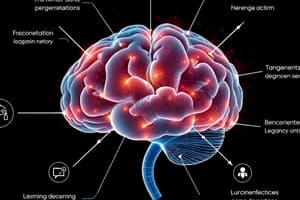Podcast
Questions and Answers
Learning is involved not only in the mastery of a new skill or academic subject but also in the development of emotions, social interaction and even personality. We learn to adjust, love, fear, hate and so on. Man continuously learns from the time he is born to the time he becomes old. Learning just like education is a non-stop process and there is always something to learn. And one of the most important characteristics of man is his ability to learn.
Learning is involved not only in the mastery of a new skill or academic subject but also in the development of emotions, social interaction and even personality. We learn to adjust, love, fear, hate and so on. Man continuously learns from the time he is born to the time he becomes old. Learning just like education is a non-stop process and there is always something to learn. And one of the most important characteristics of man is his ability to learn.
learning
Learning – defined as a complex process which brings about an enduring change in ______ as a result of practice.
Learning – defined as a complex process which brings about an enduring change in ______ as a result of practice.
behavior
Habituation - is the simplest kind of learning.
Habituation - is the simplest kind of learning.
habituation
Associative Learning - is the next level of learning wherein we form new association between a stimulus and a response (s – r theory).
Associative Learning - is the next level of learning wherein we form new association between a stimulus and a response (s – r theory).
Classical Conditioning – involves the transfer of response from one stimulus to another stimulus through repeated pairings.
Classical Conditioning – involves the transfer of response from one stimulus to another stimulus through repeated pairings.
Reinforcement – refers to an event which may enhance or maintain the strength of a response.
Reinforcement – refers to an event which may enhance or maintain the strength of a response.
Spontaneous Recovery – is a partial recovery in the strength of an extinguished conditioned ______ after a rest interval
Spontaneous Recovery – is a partial recovery in the strength of an extinguished conditioned ______ after a rest interval
Generalization – is the tendency of the ______ that is similar to the conditioned ______ to elicit the conditioned response
Generalization – is the tendency of the ______ that is similar to the conditioned ______ to elicit the conditioned response
Discrimination – is the opposite of generalization. It is the process of responding to the variation or differences between ______
Discrimination – is the opposite of generalization. It is the process of responding to the variation or differences between ______
Higher-order Conditioning – aids the ______ to become flexible with his responses to the environment
Higher-order Conditioning – aids the ______ to become flexible with his responses to the environment
Operant or Instrumental Conditioning – the ______ is allowed to discover how his behavioral response affects the environment and vice-versa
Operant or Instrumental Conditioning – the ______ is allowed to discover how his behavioral response affects the environment and vice-versa
Shaping – refers to a series of ______ wherein each response leads to the next response
Shaping – refers to a series of ______ wherein each response leads to the next response
Stimulus Generalization – refers to the tendency of a ______, which is similar to the one used in training to elicit the same response
Stimulus Generalization – refers to the tendency of a ______, which is similar to the one used in training to elicit the same response
Partial Reinforcement – the responses made by an ______ are reinforced only part of the time
Partial Reinforcement – the responses made by an ______ are reinforced only part of the time
Secondary Reinforcement – these ______ are learned, they refer to a stimulus that has gained a reinforcing property by having been paired with a primary reinforcer
Secondary Reinforcement – these ______ are learned, they refer to a stimulus that has gained a reinforcing property by having been paired with a primary reinforcer
Social Learning - Albert Bandura is the most prominent social learning ______ who has engaged in many experiments involving learning by observing which otherwise known as vicarious learning or modeling, because a model is being imitated
Social Learning - Albert Bandura is the most prominent social learning ______ who has engaged in many experiments involving learning by observing which otherwise known as vicarious learning or modeling, because a model is being imitated
Which kind of learning involves the transfer of response from one stimulus to another stimulus through repeated pairings?
Which kind of learning involves the transfer of response from one stimulus to another stimulus through repeated pairings?
What is the simplest kind of learning?
What is the simplest kind of learning?
What refers to a series of responses wherein each response leads to the next response?
What refers to a series of responses wherein each response leads to the next response?
Which type of reinforcement refers to a stimulus that has gained a reinforcing property by having been paired with a primary reinforcer?
Which type of reinforcement refers to a stimulus that has gained a reinforcing property by having been paired with a primary reinforcer?
What is the opposite of generalization in the context of learning?
What is the opposite of generalization in the context of learning?
Which prominent psychologist has engaged in many experiments involving learning by observing, also known as vicarious learning or modeling?
Which prominent psychologist has engaged in many experiments involving learning by observing, also known as vicarious learning or modeling?
What is the term for the decrease in the strength of a conditioned response resulting from repeatedly eliciting the response in the absence of reinforcement?
What is the term for the decrease in the strength of a conditioned response resulting from repeatedly eliciting the response in the absence of reinforcement?
Which phenomenon refers to the tendency of a stimulus similar to the conditioned stimulus to elicit the conditioned response?
Which phenomenon refers to the tendency of a stimulus similar to the conditioned stimulus to elicit the conditioned response?
What kind of learning involves increasing the probability of similar responses due to the presence of reinforcement?
What kind of learning involves increasing the probability of similar responses due to the presence of reinforcement?
Which process involves responding to the variation or differences between stimuli?
Which process involves responding to the variation or differences between stimuli?
What refers to a series of responses wherein each response leads to the next response?
What refers to a series of responses wherein each response leads to the next response?
What is the term for a partial recovery in the strength of an extinguished conditioned response after a rest interval?
What is the term for a partial recovery in the strength of an extinguished conditioned response after a rest interval?
Which refers to reinforcers that are learned and have gained a reinforcing property by being paired with a primary reinforcer?
Which refers to reinforcers that are learned and have gained a reinforcing property by being paired with a primary reinforcer?
What is the term for the next level of learning wherein new associations between a stimulus and a response are formed?
What is the term for the next level of learning wherein new associations between a stimulus and a response are formed?
What is the term for proficiency and competency in a certain kind of performance?
What is the term for proficiency and competency in a certain kind of performance?
What involves allowing the learner to discover how his behavioral response affects the environment and vice-versa?
What involves allowing the learner to discover how his behavioral response affects the environment and vice-versa?
Flashcards are hidden until you start studying




